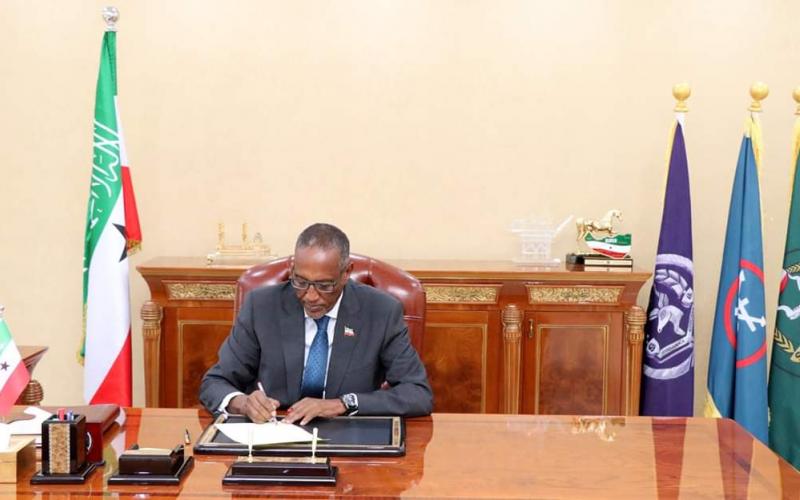Islam is the real positive change that you need to change for being a better person or a perfect human being, you can change yourself if you read QURAN, IF YOU DO THAT !! you will change this UMMAH, say I am not A Sunni or Shia, BUT I am just a MUSLIM. Be a walking QURAN among human-being AND GUIDE THEM TO THE RIGHT PATH.
Tuesday, December 31, 2019
Sunday, December 29, 2019
Saturday, December 28, 2019
Friday, December 27, 2019
Thursday, December 26, 2019
Sunday, December 22, 2019
Saturday, December 21, 2019
Thursday, December 19, 2019
Monday, December 16, 2019
Sunday, December 15, 2019
Saturday, December 14, 2019
Friday, December 13, 2019
Thursday, December 12, 2019
Wednesday, December 11, 2019
The remarkable story of WorldRemit founder Ismail Ahmed: ‘I became a whistle blower and lost my job’
Somaliland Monitor
Somaliland News
By Daphne Leprince-Ringuet
A refugee from Somalia and a whistleblower at the United Nations, now an entrepreneur. Ismail Ahmed, the co-founder of online money transfer service WorldRemit, knows all about the money channels that migrants use when sending funds home. And he’s made it his aim to make remittances a smoother process.
In 1988, during the war in his homeland, Ahmed was smuggled out of Hargeisa, the capital of the self-declared but internationally unrecognised Republic of Somaliland, in a tipper truck. He eventually got to Britain and started doing odd jobs such as strawberry-picking in the summer, just to be able to send money to his family – who by then lived in a refugee camp in Ethiopia. The transfers were expensive and took months to complete.
In the early 2000s, Ahmed got a job at the UN as an advisor to regional transfer companies in East Africa. While there, he says he noticed corruption at the UN’s Development Programme for Somalia, with fraud often happening in the remittances programme. “I became a whistleblower and lost my job,” he says. In 2010, he received £200,000 in compensation from the UN for unfair treatment – and, having by then competed an MBA from the London Business School, used the money to setup London-based startup WorldRemit.
Nearly a decade on, Ahmed’s company now has almost four million customers globally, who send money from 50 countries to recipients in more than 150 nations. With nearly $375 million in funding, the company is soon expected to reach one billion dollar valuation.
It may look like any other money transfer service, but Ahmed, who moved from the position of CEO to non-executive chairman last year, argues that its business model is unique. Instead of sending funds only from bank to bank (which it also does) like digital upstart TransferWise or the traditional money transfer companies Western Union and MoneyGram, the transfers are also sent to a mobile wallet directly – with a smartphone.
While Western Union and MoneyGram have operated remittances services for years, they still rely on intermediate agents, typically corner shops, where migrants go to collect their cash. The agents are responsible for carrying out regulatory compliance such as Know Your Client identity checks, documenting every money movement.
WorldRemit, on the other hand, partners with local banks and mobile networks; in Kenya, for example, it is working with electronic wallet service M-Pesa, so that money can be transferred instantly to all customers. The recipient can retrieve the funds as a bank deposit into a local WorldRemit bank account, as mobile money, airtime top-up or as cash at a supermarket. The fees are two to three per cent lower than those charged by most banks. WorldRemit’s closest rival is Remitly, another digital-only company that specialises in sending money from developed countries to the developing world.
Digitalising remittances also helps safeguarding the industry against money laundering: in a market still heavily dominated by cash tracking criminal activity is very difficult. WorldRemit’s digital system checks users against international watchlists and sanction databases and analyses their behaviour to look out for suspicious patterns. Every transaction leaves a digital trail, making it easier to spot and source criminal activities and networks. “If a transaction is suspicious, there is a wealth of data to trace it back to a bank account, a card, an identity,” says Ahmed. “That’s coming a long way from agents, who can be untrained at best, and turn a blind eye at worst.” And, he adds, WorldRemit has never been fined.
Source: wired
Tuesday, December 10, 2019
Monday, December 9, 2019
Sunday, December 8, 2019
Kenya hunts down al-Shabaab fighters after deadly attack
HalQarn News
by Halqaran
The attack on Friday evening claimed lives of eight non-locals traveling to Mandera.
Speaking to the media Northeastern regional commissioner Mohamed Birik said that security officers led by special forces have been deployed on the ground and are conducting both ground and aerial surveillance to pursue al-Shabaab fighters.
“As a government, we will never relent. We will go for them and smoke them out of their hideouts. Our resolve to completely eliminate this region of these heartless people is never in doubt,” he said.
The official said the government directed the heads of security agencies to take measures to secure the region and protect the citizens.
“In the meantime, all the three county commissioners and the entire intelligence committees are under a directive to ensure that suitable measures are put in place to ensure that the lives of Kenyans are protected including providing escort to the buses that ply Mandera and Wajir route. I have already communed the same with them,” he said.
Wajir Governor Mohamed Abdi has condemned the the attack and urged the national government to be proactive in matters security ’and not to wait for such incidences to happen before acting’.
“I want to appeal to our security apparatus to remain proactive and on alert at all times. we cannot be loosing live in the hands of the militants in this day and age,” he said.
Madaxweynaha Somaliland Oo Xilka Qaadis Iyo Magacaabid Ku Sameeyey Xubno Ka Mida Golaha Wasiirrada
Waxaanay u dhignaayeen wareegtooyinka madaxweynuhu sidan:-
Wareegto Madaxweyne
Ujeeddo: Xil Ka-qaadis
Ku: Cabdirisaaq Cali Cabdi Saalax
Wasiirkii hore ee Wasaaradda Cadaaladda;
Ku: Cabdiraxiim Cismaan Xaaji Cabdi (Shibbiin)
Wasiirkii hore ee Wasaaradda Qorshaynta iyo Horumarinta Qaranka
Ku: Cismaan Aadan Jaamac
Wasiirkii hore ee Wasaaradda Waxbarashada iyo Sayniska
Ku: Xuseen Ibraahim Xasan Buuni
Wasiir Ku-xigeenkii hore ee Wasaaradda Qorshaynta iyo Horumarinta Qaranka
Ku: Cabdiqaadir Maxamuud Sh. Muxummed Warsame
Wasiir Ku-xigeenkii hore ee Wasaaradda Horumarinta Maaliyadda
Mudanayaal,
Sida aad la socotaan, xilka qaranka ayey sunnihiisa tahay in uu meerto noqdo, oo loo igmado hadba ciddii hannan karta. Sidaa darteed, waxaan gartay in laga bilaabo taariikhda maanta aan idinka qaado xilalka aad hayseen ee kor ku xusan.
Waxaan idiinka mahad-celinayaa muddadii aad hayseen xilalka Qaranka.
Ujeeddo: Magacaabid
[Markaan Arkay: Dastuurka Jamhuuriyadda Somaliland, Qodobka 90aad;
Markaan Arkay: Aqoontooda, Kartidooda iyo Waaya-aragnimadooda;
Markaan ku Qancay: In ay Hanan Karaan Masuuliyadda ka Dhalanaysa Xilalkan;
Markaan Sameeyey: La-tashi;
Waxaan Go’aamiyey;
In laga bilaabo taariikhda maanta aan masuuliyiintan u magacaabo xilalkan:
1. Xasan Maxamed Cali Gaafaadhi Wasiirka Wasaaradda Qorshaynta iyo Horumarinta Qaranka.
2. Axmed Maxamed Diiriye Cige Wasiirka Wasaaradda Waxbarashada iyo Sayniska.
3. Siciid Sulub Maxamed Xuseen Wasiirka Wasaaradda Xannaanada Xoolaha iyo Horumarinta Kalluumaysiga.
4. Saleebaan Yuusuf Cali Koore Wasiirka Wasaaradda Warfaafinta, Wacyigelinta iyo Dhaqanka.
5. Maxamed Muuse Diiriye Wacays Wasiirka Wasaaradda Horumarinta Biyaha.
6. Mustafe Maxamuud Cali Bile Wasiirka Wasaaradda Caddaalada.
7. LiibaanYuusuf Cismaan Xuseen Wasiir Ku-xigeenka Wasaaradda Arrimaha Dibedda iyo Iskaashiga Caalamiga ah.
8. Cabdiqaadir Cumar Jaamac Maxamed Wasiir Ku-xigeenka Wasaaradda Qorshaynta iyo Horumarinta Qaranka.
9. Mahdi Cabdillaahi Cismaan Maxamed Wasiir Ku-xigeenka Wasaaradda Horumarinta Caafimaadka.
10. Muuse Ibraahim Yuusuf Salaf Wasiir Ku-xigeenka Wasaaradda Horumarinta Maaliyadda.
11. Cabdillaahi Maxamed Daahir Cukuse La-taliyaha Madaxweynaha ee Arrimaha Doorashooyinka
ALLAA MAHAD LEH
Muuse Biixi Cabdi
Madaxweynaha JSL.
https://www.radiohormuud.dk/index.php/news/madaxweynaha-somaliland-oo-xilka-qaadis-iyo-magacaabid-ku-sameeyey-xubno-ka-mida-golaha
Saturday, December 7, 2019
Friday, December 6, 2019
Thursday, December 5, 2019
Wednesday, December 4, 2019
Monday, December 2, 2019
Sunday, December 1, 2019
Wednesday, November 27, 2019
Monday, November 25, 2019
Thursday, November 21, 2019
Wednesday, November 20, 2019
Monday, November 18, 2019
Sunday, November 17, 2019
Saturday, November 16, 2019
Friday, November 15, 2019
Thursday, November 14, 2019
Wednesday, November 13, 2019
Tuesday, November 12, 2019
Monday, November 11, 2019
Sunday, November 10, 2019
Friday, November 8, 2019
Thursday, November 7, 2019
Wednesday, November 6, 2019
Tuesday, November 5, 2019
Sunday, November 3, 2019
Saturday, November 2, 2019
Friday, November 1, 2019
Thursday, October 31, 2019
Wednesday, October 30, 2019
Monday, October 28, 2019
Monday, October 21, 2019
'We are scared they will send us back': child victims speak out in Britain

Friday October 18, 2019
 “We’re getting confused, we are scared every night that they will
send us back. We cannot sleep,” said Anna (not her real name), a
16-year-old from the Horn of Africa.
“We’re getting confused, we are scared every night that they will
send us back. We cannot sleep,” said Anna (not her real name), a
16-year-old from the Horn of Africa.For child survivors of slavery who were trafficked to Britain, there is no guarantee that they will find help from the government. Many, like Anna, fear they they will be deported for immigration offenses rather than be treated as a victim of modern slavery.
Speaking to members of parliament on Wednesday, child trafficking survivors spoke out about their need for government to improve support services.
Reuters reports:
Child victims have no legal guarantee of specialist support nor any right to remain in Britain post-trafficking, [but] measures [are] under review amid campaigner concerns about the act.Last year, some 3,137 children suspected of being trafficked were referred to the government. That marked an increase of 48% from 2017 and the highest number on record.
Many said that the government had no intention of making changes for children like Anna, and called for concrete change – from temporary documentation during the immigration process to language support for legal meetings and educational courses.
One temporary carer of trafficked children – who asked to remain anonymous to protect the young people under her care – recalled a lack of interpreters and a dearth of compassion.
“They’re not seen as children … They are seen as something in the immigration system with no rights and I am ashamed that that’s the way we support young people in this country,” she said, holding back tears.
“There’s not one bit of a young person’s journey where provision is fit for purpose.”
Most child victims were British, though hundreds of others were trafficked from abroad from countries including Albania, Vietnam, and Eritrea.
“The system needs to wake up and get a move on and just apply some common sense really,” said Vernon Coaker, moderator of the event and an opposition member of the British parliament.
“It’s wrong when a system is set up where people have to fight all the time to get what should just happen.”
Read more: 'We are scared they will send us back': child victims speak out in Britain
Qatar set to abolish ‘kafala’ system in January before 2022 World Cup
In a major development, Qatar is set to finally abolish its notorious “kafala” system in January according to an announcement from the International Labour Organization.
The kafala (sponsorship) system is present in many other countries besides Qatar and has long been criticized as an enabler of modern slavery. It ties migrant workers’ immigration status to their employer, meaning that a worker cannot change jobs or even leave the country unless they get approval from their employer, including abusive ones.
“Cabinet has adopted new legislation related to a new law for minimum wage and also a new regulation to facilitate labour transfer to a new employer … and a draft law to abolish exit permits,” Labour Minister Yousuf Mohamed al-Othman Fakhroo told the AFP.
The ILO said that Qatar’s ministers had agreed to end kafala and also introduce “a non-discriminatory minimum wage —the first of its kind in the Middle East. The planned reforms must next pass through the country’s advisory (“shura”) council, before approval by the emir, Sheik Tamim bin Hamad Al Thani.
The Guardian reports:
Human rights groups have campaigned for years to have kafala abolished across the Gulf, whose countries use millions of low-paid immigrant workers mostly from the Indian subcontinent. Fifa’s decision to locate the 2022 World Cup in Qatar has hugely increased scrutiny, and the Qatar government ultimately responded by signing a formal cooperation with the ILO promising to implement improvements.Speaking to the AFP, King’s College London assistant professor Andreas Krieg said the reforms “were the final step in liberalising the labor market in Qatar.”
Describing the abolition of exit permits and “no-objection certificates” for workers moving jobs as marking “the end of kafala,” the ILO said: “These steps will greatly support the rights of migrant workers, while contributing to a more efficient and productive economy.”
The level of the minimum wage, a key reform given the low pay for migrant workers in Qatar, the world’s richest per-capita country, will be set later this year, the ILO said, and not discriminate between nationalities. Last year the Guardian reported that men working on World Cup stadium construction sites far from their families overseas, and living in “labour camps”, were being paid £40 per week in Qatar.
“The Qataris feel the pressure from the international media to make changes and they really recognised this since 2017 that they have to make concessions and improvements – and they have.”
If the end of the kafala is realised as hoped, there is still one issue that remains to be resolved. That is the high incidence of fatal heart attacks suffered by migrant workers exposed to oppressive heat and humidity. The Guardian reported on this crisis, finding that previously healthy young men were dying because of heat stress.
Read more: Qatar set to abolish ‘kafala’ system in January before 2022 World Cup
Saturday, October 19, 2019
Thursday, October 17, 2019
Wednesday, October 16, 2019
Sunday, October 13, 2019
Saturday, October 12, 2019
Thursday, October 10, 2019
Monday, October 7, 2019
Sunday, October 6, 2019
Saturday, October 5, 2019
Thursday, October 3, 2019
Wednesday, October 2, 2019
Tuesday, October 1, 2019
Sunday, September 29, 2019
Saturday, September 21, 2019
Friday, September 20, 2019
Wednesday, September 18, 2019
Tuesday, September 17, 2019
Saturday, September 14, 2019
Friday, September 13, 2019
Thursday, September 12, 2019
Wednesday, September 11, 2019
Friday, September 6, 2019
Thursday, September 5, 2019
Wednesday, September 4, 2019
Tuesday, September 3, 2019
Monday, September 2, 2019
Sunday, September 1, 2019
Saturday, August 31, 2019
Friday, August 30, 2019
Friday, August 23, 2019
Thursday, August 22, 2019
Wednesday, August 21, 2019
Tuesday, August 20, 2019
Monday, August 19, 2019
Sunday, August 18, 2019
Friday, August 16, 2019
Thursday, August 15, 2019
Wednesday, August 14, 2019
Tuesday, August 13, 2019
Monday, August 12, 2019
Sunday, August 11, 2019
Friday, August 9, 2019
Thursday, August 8, 2019
Wednesday, August 7, 2019
Tuesday, August 6, 2019
Monday, August 5, 2019
Sunday, August 4, 2019
Subscribe to:
Comments (Atom)





